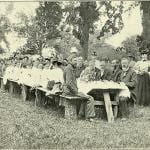On Reformation Day, mentions of Martin Luther are legion. This post is not about Luther per se but builds on his 1520 pamphlet, The Freedom of a Christian, to underscore the spiritual nature of the gospel and the liberty it promises. Luther distinguished between the inner man, which enjoyed complete freedom, and the outer man, which was servant to everyone and everything.
Keeping that distinction between the spiritual and temporal is difficult because many Christians want faith to be relevant to all of life. Or sometimes they want the gospel to be on the right side of the political divide, such as Commonweal’s recent criticism of William Barr’s speech at Notre Dame on religious freedom:
Barr’s speech was a snide version of conservative Catholic boilerplate, designed not to persuade anyone but to flatter true believers and incite the troops. Barr claimed that “Christianity teaches a micro-morality. We transform the world by focusing on our own personal morality and transformation.” But this “micro-morality” has more to do with Republican Party orthodoxy than with the Gospel. So much for the long record of the church’s support for labor unions and a robust role for government in caring for the poor and promoting civic virtue. So much for Catholic social teaching, period. Barr seems to believe the church can tell you what is moral in the bedroom, but not in the workplace or the marketplace.
Entirely missing here is Luther’s distinction since the argument locates one version of Christianity on the Republican side of the aisle while church has historically stood with labor unions and welfare for the poor (read Democrats). Roman Catholics might miss what Luther was saying if they identify Christianity with law rather than gospel. That leaves competing moralities prey to either the Democratic or the Republican civil religion. Luther’s point was to abandon moralism, whether William Barr’s or Commonweal’s.
Another failure to capture Luther’s point about Christian liberty comes when trying to turn the God of the reformer’s famous hymn, A Mighty Fortress, from a fortress into a refuge. From what threats and perils do Christians turn to God for help? Chris Gehrz says that the answer has to do with the way that God will be exalted among the nations (from Psalm 46):
How will it come to be that God is exalted among the nations? How will the eternal God be exalted here, in a world of change and tumult and collapse and conflict?
Not with us looking down on a battlefield from behind the cover of walls and shields. God will be exalted among the nations because we go out among the nations. God will be exalted in the earth because that’s where we live and serve.
God will be exalted when we relax our stance, come out from behind our positions, and dwell among neighbors and enemies alike. We will be still together; we will know God together. Together, we will come into God’s refuge and God’s strength.
As true as that may be that God is glorified by peace and stability in this world, it is fairly distant from the kind of fortress that Luther had in mind when he talked about Christian freedom. The real threat to people is not war, poverty, or hunger because these are temporal aspects of human existence. The real perils were and remain sin and its consequences for judgment day. God only became a refuge and a fortress against sin and the devil when Christ took upon himself the sins of the world and rose victorious from the dead. That leads to a Christian freedom that English Protestants confessed about 125 years after Luther but that still echoed the German reformer:
The liberty which Christ hath purchased for believers under the gospel consists in their freedom from the guilt of sin, the condemning wrath of God, the curse of the moral law; and, in their being delivered from this present evil world, bondage to Satan, and dominion of sin; from the evil of afflictions, the sting of death, the victory of the grave, and everlasting damnation; as also, in their free access to God, and their yielding obedience unto him, not out of slavish fear, but a childlike love and willing mind. All which were common also to believers under the law. But, under the new testament, the liberty of Christians is further enlarged, in their freedom from the yoke of the ceremonial law, to which the Jewish church was subjected; and in greater boldness of access to the throne of grace, and in fuller communications of the free Spirit of God, than believers under the law did ordinarily partake of. (Westminster Confession 20.1)
And in case you think this sounds like political liberty, English Protestants followed Luther again when they quickly insisted that the freedom of the gospel had little to do with political freedom:
because the powers which God hath ordained, and the liberty which Christ hath purchased, are not intended by God to destroy, but mutually to uphold and preserve one another, they who, upon pretense of Christian liberty, shall oppose any lawful power, or the lawful exercise of it, whether it be civil or ecclesiastical, resist the ordinance of God. And, for their publishing of such opinions, or maintaining of such practices, as are … destructive to the external peace and order which Christ hath established in the church, they may lawfully be called to account, and proceeded against, by the censures of the church. (20.4)












